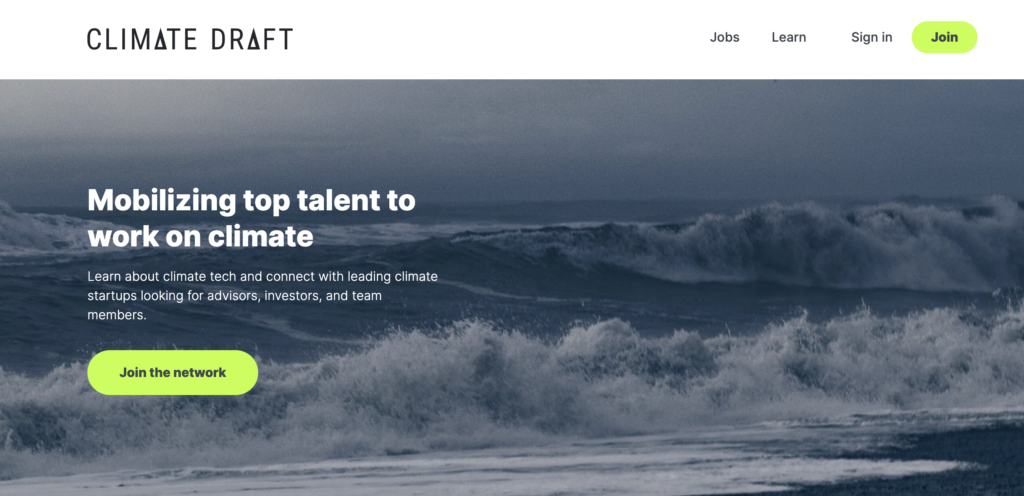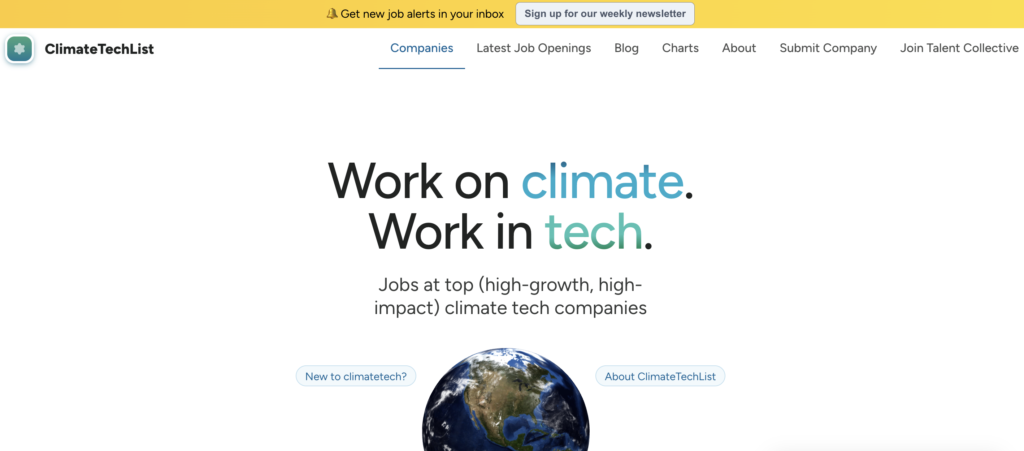Climate Jobs – Top job boards for climate careers
In a world facing increasingly urgent environmental challenges, the climate jobs market has emerged as a dynamic and rapidly expanding sector. As the consequences of climate change become more pronounced, governments, businesses, and organizations worldwide are seeking skilled professionals to drive sustainability initiatives, reduce carbon footprints, and tackle the multifaceted issues associated with global warming. In this section, we will delve into the intricacies of the climate job market, shedding light on its scope, growth, and the skills in demand.
If you are wondering how to get into climate tech or how to get into climate change jobs, keep reading…
Table of Contents
- The Growing Demand for Climate Jobs
- Diverse Range of Industries
- Skills and Qualifications in Demand
- The Benefits of Pursuing a Climate Career
- Top Websites for Finding Climate Jobs
- Tips for a Successful Climate Job Search
The Growing Demand for Climate Jobs
One of the most notable features of the climate job market is its remarkable growth in recent years. As climate change becomes an ever more pressing global issue, there is a surging demand for professionals with expertise in areas like renewable energy, environmental conservation, and climate policy. Consider this: the renewable energy sector alone has seen explosive growth, creating millions of jobs worldwide. The transition to clean and green technologies is no longer just an environmental aspiration but a fundamental economic driver.
Diverse Range of Industries
The climate job market extends its branches into a multitude of industries and sectors, each playing a crucial role in the fight against climate change. These sectors include but are not limited to:
- Renewable Energy: Wind, solar, hydro, and geothermal energy industries offer opportunities for engineers, technicians, and project managers.
- Environmental Conservation: Conservationists, ecologists, and environmental scientists work to protect ecosystems and biodiversity.
- Sustainable Agriculture: Sustainable farming practices require agronomists, soil scientists, and sustainable agriculture specialists.
- Green Technology: Innovators in green tech create cutting-edge solutions for sustainability.
- Climate Policy and Advocacy: Policy analysts and advocates drive legislative changes and raise awareness.
- Climate Science and Research: Climate scientists, meteorologists, and researchers study climate patterns and develop models to understand and mitigate climate change.
- Carbon Management and Emissions Reduction: Experts in carbon accounting and emissions reduction help organizations track and reduce their carbon footprints.
Find sustainability jobs, environmental jobs & impact focused jobs through these job boards 2023 ↗️
Skills and Qualifications in Demand
To excel in the climate jobs market, job seekers should possess a diverse set of skills and qualifications. These may include expertise in climate science, renewable energy technologies, sustainability practices, data analysis, policy development, and cross-disciplinary knowledge that bridges environmental science with other fields.
The Benefits of Pursuing a Climate Career
In today’s world, choosing a climate career is more than just a job; it’s a commitment to making a positive impact on the planet. Here are the key benefits:
1. Purpose and Impact: Climate professionals directly address urgent global challenges, providing a profound sense of purpose and meaningful impact.
2. Career Growth: The climate job market is booming, offering job stability and countless advancement opportunities.
3. Diverse Fields: Climate careers cater to various skills and interests, from science and engineering to policy and communication.
4. Global Relevance: Your work contributes to a worldwide effort to combat climate change, making it a globally significant field.
5. Intellectual Challenge: Climate careers involve tackling complex, interdisciplinary challenges that require creativity and problem-solving.
6. Personal Fulfillment: Align your values with your profession, finding deep personal fulfilment in contributing to a sustainable future.
7. Innovation: Climate professionals often drive innovation and entrepreneurship in sustainable technologies and practices.
8. Networking: Join a vibrant, collaborative community of like-minded individuals and experts in the climate field.
9. Positive Industry Trends: Climate-related industries, like renewable energy, are on the rise, offering promising career prospects.
10. Change-Maker: Climate careers empower you to influence policies, technologies, and practices, enabling you to be a catalyst for positive change.
Top Websites for Finding Climate Jobs
1. Climate Tech VC
Description: Climate Tech VC is likely a venture capital or investment platform focused on climate technology startups. It could provide funding and support to companies working on innovative climate solutions.
Benefits for Job Seekers: Job seekers can explore opportunities within startups funded by Climate Tech VC, which are at the forefront of climate innovation. These companies often hire for roles in technology, engineering, research, and more.
___
2. Climate People
Description: Climate People appears to be a community or network dedicated to connecting professionals in the climate field. It likely offers resources and networking opportunities.
Benefits for Job Seekers: Job seekers can expand their professional network, connect with experts in the climate sector, and potentially discover job leads. The community aspect fosters collaboration and knowledge-sharing.
___
3. Climate Draft
Description: Climate Draft may be associated with climate policy, advocacy, or research. It could offer resources and information related to climate policy initiatives.
Benefits for Job Seekers: Individuals interested in careers in climate policy and advocacy can use Climate Draft to explore job opportunities in these fields. It might provide insights into organizations and initiatives driving climate policy changes.
___
4. ClimateAction.tech
Description: ClimateAction.tech seems to focus on technology solutions for climate action, making it a valuable resource for tech-oriented individuals passionate about climate issues.
Benefits for Job Seekers: Job seekers in tech-related roles can explore climate-related job opportunities, especially in the innovation and technology sectors. The platform may provide access to tech-specific climate resources and job listings.
___
5. ClimateTechList
Description: ClimateTechList appears to be a directory or list of climate technology companies and organizations. It likely offers information about various climate tech entities.
Benefits for Job Seekers: Job seekers can use ClimateTechList to discover potential employers in the climate tech industry. It may serve as a valuable resource for researching companies and organizations in this sector.
Tips for a Successful Climate Job Search
1. Tailor Your Application: Customize your resume and cover letter for each job application, highlighting your relevant skills and passion for climate work.
2. Find Your Niche: Identify your specific area of interest within the climate sector to narrow your job search and enhance your expertise.
3. Online Presence: Create a strong online presence, particularly on LinkedIn, to network effectively and catch the attention of potential employers.
4. Network Actively: Attend climate-related events, and conferences, and join online forums and groups to connect with professionals in the field.
5. Stay Informed: Keep up-to-date with climate trends, technologies, and policies to demonstrate your commitment and knowledge.
6. Gain Experience: Consider internships or volunteer work in the climate sector to build practical experience and demonstrate dedication.
7. Interview Preparation: Thoroughly research potential employers, rehearse interview responses, and showcase your passion for climate work during interviews.
8. Highlight Transferable Skills: Emphasize transferable skills from previous roles that align with climate careers.
9. Further Education: Think about additional education or certifications to enhance your qualifications.
10. Stay Persistent: Set realistic goals, be persistent, and adapt your strategies as needed during your job search.
11. Seek Mentorship: Reach out to experienced professionals in the climate field for guidance and mentorship.
12. Use Climate Jobs Boards: Utilize specialized climate job boards and websites dedicated to green careers for streamlined job searches.
FAQs
How do I switch to a climate career?
To switch to a climate career, start by identifying your specific interests within the climate sector. Gain relevant knowledge and skills through courses or certifications. Network with professionals in the field, update your resume and seek opportunities on climate job boards.
_
How to work in climate science?
To work in climate science, pursue a degree in environmental science, meteorology, or related fields. Gain research experience and stay updated on climate research. Look for jobs with research institutions, universities, or government agencies.
_
Is climate change a good career?
Yes, climate change offers a promising career path. The growing demand for climate professionals in various sectors, including renewable energy, policy, and conservation, makes it a rewarding and impactful choice.
_
Who is a climate analyst?
A climate analyst is an expert who analyses climate data, assesses its impact, and contributes to climate-related decision-making. They work in research, government agencies, NGOs, or private sectors to address climate challenges.
_
What are different climate careers?
Climate careers encompass diverse roles such as climate scientist, renewable energy specialist, climate policy analyst, environmental consultant, sustainability manager, and more. The field offers opportunities for various skills and interests.
_
Is climate science in demand?
Yes, climate science is in high demand. The urgent need to address climate change has increased the demand for climate scientists, researchers, and professionals in various sectors worldwide.










